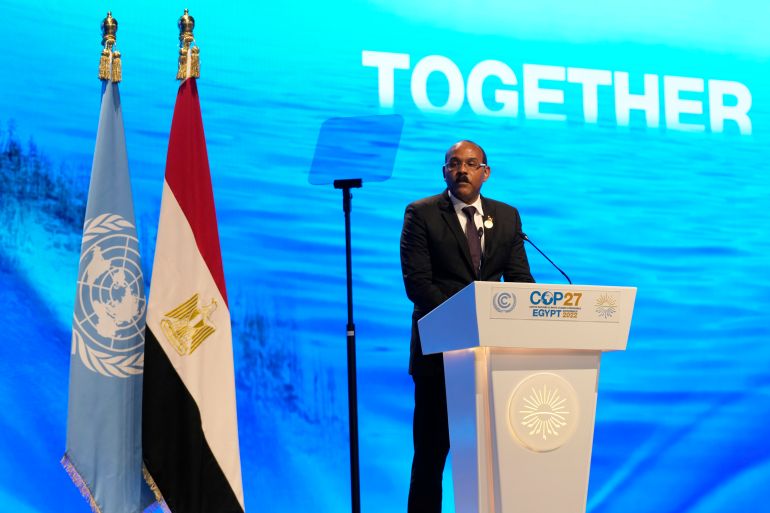Tax oil firms to pay for climate damage, island nations say
A group of small countries at UN climate talks demand oil companies compensate developing countries for climate-induced disasters.

A group of small island nations has joined calls for a windfall tax on oil companies to compensate developing countries for the damage caused by climate change-induced natural disasters.
Developing nations have pressed their case at the UN’s COP27 climate summit in Egypt for the creation of a “loss and damage” fund, arguing that rich nations are to blame for the biggest share of greenhouse gas emissions.
Keep reading
list of 4 itemsPhotos: High hopes for COP27, but warnings of disappointment
Hunger striker’s sister to push for his release in Egypt COP27
‘We’re on highway to climate hell with our foot on accelerator’
Climate injustice is a major theme of the climate summit, and anger on Tuesday was directed at the oil industry, whose multibillion-dollar profits since Russia’s invasion of Ukraine in February have led to anger across a world concerned about climate change and rampant consumer inflation.
On Tuesday, the host of the COP27 climate talks launched a 30-point plan to help the world’s poorest communities withstand the impacts of global warming. The plan seeks to disburse up to $300bn a year from private and public investors.
“The COP27 presidency has long articulated our commitment to bringing together state and non-state actors to progress on adaptation and resilience for the 4 billion people that live in the most climate vulnerable regions by 2030,” the summit’s president and Egypt’s minister of foreign affairs, Sameh Shoukry, said in a statement.
US President Joe Biden this month said the industry was raking in “war profits” and proposed a windfall tax, an idea that has little chance of passing a divided Congress.
“It is about time that these companies are made to pay a global COP carbon tax on these profits as a source of funding for loss and damage,” Gaston Browne, the prime minister of Antigua and Barbuda, told fellow leaders at the summit in the seaside resort of Sharm el-Sheikh.
“While they are profiting, the planet is burning,” said Browne, who spoke on behalf of the 39-nation Alliance of Small Island States, many of whose very existence is threatened by rising sea levels and increasingly intense tropical storms.
Barbados Prime Minister Mia Mottley called Monday for a 10 percent tax on oil companies to fund loss and damage.
The contentious issue of loss and damage was added to the COP27 agenda after intense negotiations.
The United States and European Union have dragged their feet on the issue in the past, fearful of creating an open-ended reparations regime.
‘Toxic cover-up’
Earlier in the day, the UN chief called for an end to a “toxic cover-up” by companies as a sweeping report said they cannot claim to be net zero if they invest in new fossil fuels, cause deforestation or offset emissions instead of reducing them.
“Using bogus ‘net-zero’ pledges to cover up massive fossil fuel expansion is reprehensible. It is rank deception,” Antonio Guterres said.
“This toxic cover-up could push our world over the climate cliff,” he said. “The sham must end.”
‘Fossil fuel non-proliferation’
Browne acknowledged that putting loss and damage on the agenda was “just one step” in the process, which gives a two-year space to negotiate.
“We look forward to the establishment and officialisation of the fund by 2024,” he said.
Browne also said a group of four island nations had registered a commission with the UN to “explore the responsibility of states for injuries arising from their climate actions and breaches in the obligations”.
“As small countries this is a new dynamic pathway of justice where the polluter pays,” he said.
Browne said small island states “will fight unrelentingly this climate crisis, and this includes fighting in the international courts and under international law”.
Another island nation, Tuvalu, announced it was joining calls for a fossil fuel non-proliferation treaty, an initiative that seeks to stop new investments in coal, oil and gas and phase out production.
“The warming seas are starting to swallow our lands – inch by inch,” Tuvalu Prime Minister Kausea Natano said in a statement.
“But the world’s addiction to oil, gas and coal can’t sink our dreams under the waves,” he said.
A Pacific neighbour, Vanuatu, was the first nation to join the treaty in September.
“Vanuatu and Tuvalu are the first countries to call for a new treaty as a companion to the Paris Agreement to align oil, gas and coal production with a global carbon budget,” said Tzeporah Berman, chairwoman of the Fossil Fuel Non-Proliferation Treaty initiative.
“We will look back on this in history as the moment of reckoning with overproduction that is locking in further emissions and holding us back from bending the curve,” Berman said.
Billions for war
Sri Lankan President Ranil Wickremesinghe said governments were quick to divert billions of dollars to the war in Ukraine but slow to spend serious money on climate change.
“Double standards are unacceptable,” he said.
Scores of other heads of state and government spoke on Monday and Tuesday but many of the world’s biggest polluters – including the US, China and India – have yet to take the podium.
Biden will not arrive until Friday – after Tuesday’s midterm elections in the US.